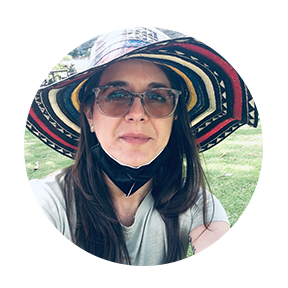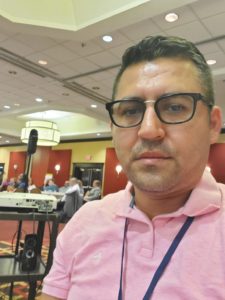Spanish GED® Recruitment

Spanish GED® Recruitment
In July 2021, the Office of Career, Technical, and Adult Education at the Virginia Department of Education released Director’s Memo NO. 037-21 clarifying that Adult Education and Family Literacy Act (AEFLA) funded adult education programs are able to provide high school equivalency (HSE) instruction in Spanish. Given this information, many adult education programs in Virginia are gearing up to offer this new service. With that being said, we can look to community-based organizations that have been offering this service to learn more about student recruitment and retention as well as instructor recruitment.
One example of such an organization is (SHC), a non-profit organization that serves the Latinx community through education and community services. They provide adult education programs, like ESL, GED® in Spanish and others, youth programs, and community outreach services with the ultimate goal of connecting members of the Latinx community to college and career opportunities.
We were able to connect with Hannah Bishop, the Adult Education Programs Coordinator at SHC and Johnny Rodriguez Zavala, the Assistant for Adult Education Programs. Hannah provided strategies to us for recruiting Spanish HSE instructors and Johnny shared information related to his personal story of becoming a Spanish GED® instructor with SHC as well as information related to how SHC supports its GED® Spanish-speaking students.
Recruiting Spanish GED® Instructors
by Hannah Bishop
“It is important to connect with the Latinx community and provide information to the community to help them understand why the GED® [credential] is so important and how it can impact their future and support them in achieving their goals.” —Johnny Rodriguez Zavala
Hannah Bishop offers her advice for programs seeking to recruit Spanish GED® instructors:
Put out an “all call”. Programs can reach out to the learner and community population to see what talent is already out there. Ask for people who are trained instructors in their home countries in the subject areas of math, social studies, natural sciences, and Spanish. Programs can try this method mixed with word-of-mouth for a few cycles to see who they are able to connect with.
Start out small. Programs should focus on getting their structure established with an instructor on board before expanding. If programs expand too quickly, they may not be successful because they have to have a strong plan in place first.
Talk to public schools. Programs can reach out to their local public schools to see if they are interested in helping to recruit instructors. Programs should look for K-12 bilingual content instructors who are interested in maintaining their full-time jobs and teaching Spanish GED® classes for supplemental income.
Recruit native Spanish speakers. Recruiting from the native Spanish speaker population is important for a few reasons. One is that this gives immigrant, Spanish speakers who were trained as educators in their home countries the opportunity to earn a livelihood while continuing their passion. Additionally, native Spanish speakers are able to connect with the learners in an authentic way. When we can find those out there who are trained and talented individuals, we should lift that up.
Look for content specialists. Spanish GED® instructors also have to be abreast of the content that they are teaching. Some content areas can be challenging, but instructors are trained to study and learn their content. This means that even if someone is not an expert in a content area, programs can work with them to ensure that they have the knowledge needed to teach that content in Spanish.
Hannah also shared information related to how SHC trains their Spanish GED® instructors. One tactic that she mentioned was that all Spanish GED® instructors sit for the GED® Practice test in their content area. She said that this prepares the instructor for lesson planning as it highlights the GED® structure and test questions, which allows instructors to integrate that information into their classrooms. This training also builds empathy so that instructors can understand the experience of taking the GED® test and use that to connect with and support their learners. A majority of SHC’s GED® learners have not had the opportunity to finish high school, so taking an official test on a computer can be a challenging experience for them. By taking the test, instructors can talk to learners about the experience helping learners feel more at ease and capable of passing the test. SHC provides additional training to their instructors every semester based on the needs of the program and the learners. For example, their recent trainings have been on digital literacy and integrating digital platforms into the traditional classroom.
If you are interested in learning more about the Spanish GED®< program at SHC or partnering with SHC, please reach out to Hannah Bishop at hannah_bishop@shcrichmond.org.
 |
Hannah Bishop is a Virginia native and has been an educator since 2003. She graduated with a bachelor’s degree in Spanish and completed her Master’s degree in education from Virginia Polytechnic Institute and State University in the early 2000’s. Her professional focus has been in English as a second language, teaching in public and private systems in various parts of the United States and in Colombia from kindergarten through grade 12. Hannah lived and worked in Bogotá and Medellín, Colombia for six years and is now passionate about serving the immigrant communities in Richmond. Her most recent role is Coordinator for the Adult Education Programs at Sacred Heart Center. |

Meet Johnny Rodriguez Zavala
Assistant for Adult Education Programs, Sacred Heart Center
Supporting Spanish GED® Students
Question 1: What is your education and professional background?
Answer: In Honduras, I received a bachelor’s degree in math and computers and taught for 12 years in high school and also in a teacher-training program at a local university. Due to political upheaval, it was dangerous for instructors in Honduras so I decided to migrate to the United States.
Question 2: How did you connect with SHC?
Answer: SHC held an event related to healthcare services for the Latinx community that I attended. At the event, I learned that there might be a need for Spanish math instruction. There was a situation in which the current instructor could not attend class, so I started by substituting when that instructor was absent. After that, I was contacted to start teaching. I taught GED® math in Spanish for 6 years before being promoted to my current position as the Assistant for Adult Programs in November of 2020.
Question 3: Who are your Spanish GED® students? What are their goals?
Answer: Our students are Latinx community members with different levels of math. Their goal is to take the GED® [test]. When they arrive in the United States, their education level is often low so they study to take the GED® [test]. After they achieve their GED® [credential], they can study for an associate degree or vocational certificate or credential.
The other goal is that when students have the GED® [credential], it opens doors for them at work and also meets their personal satisfaction. They are able to earn more money with the GED® [credential].
Question 4: How does SHC support Spanish GED® students in their English language-learning journey?
Answer: GED® classes are offered on Mondays and Wednesdays while ESL classes are on Tuesdays and Thursdays. However, students are encouraged to start with only one program due to the demand of the GED® program.
Carolina Lugo, Director of Programs at SHC, added that SHC thinks that students should focus on one goal at a time and that getting the GED® lays a firm foundation for being able to succeed in ESL classes afterwards.
Question 5: What advice do you have for recruiting learners for Spanish GED® classes?
Answer: It is important to connect with the Latinx community and provide information to the community to help them understand why the GED® [credential] is so important and how it can impact their future and support them in achieving their goals.